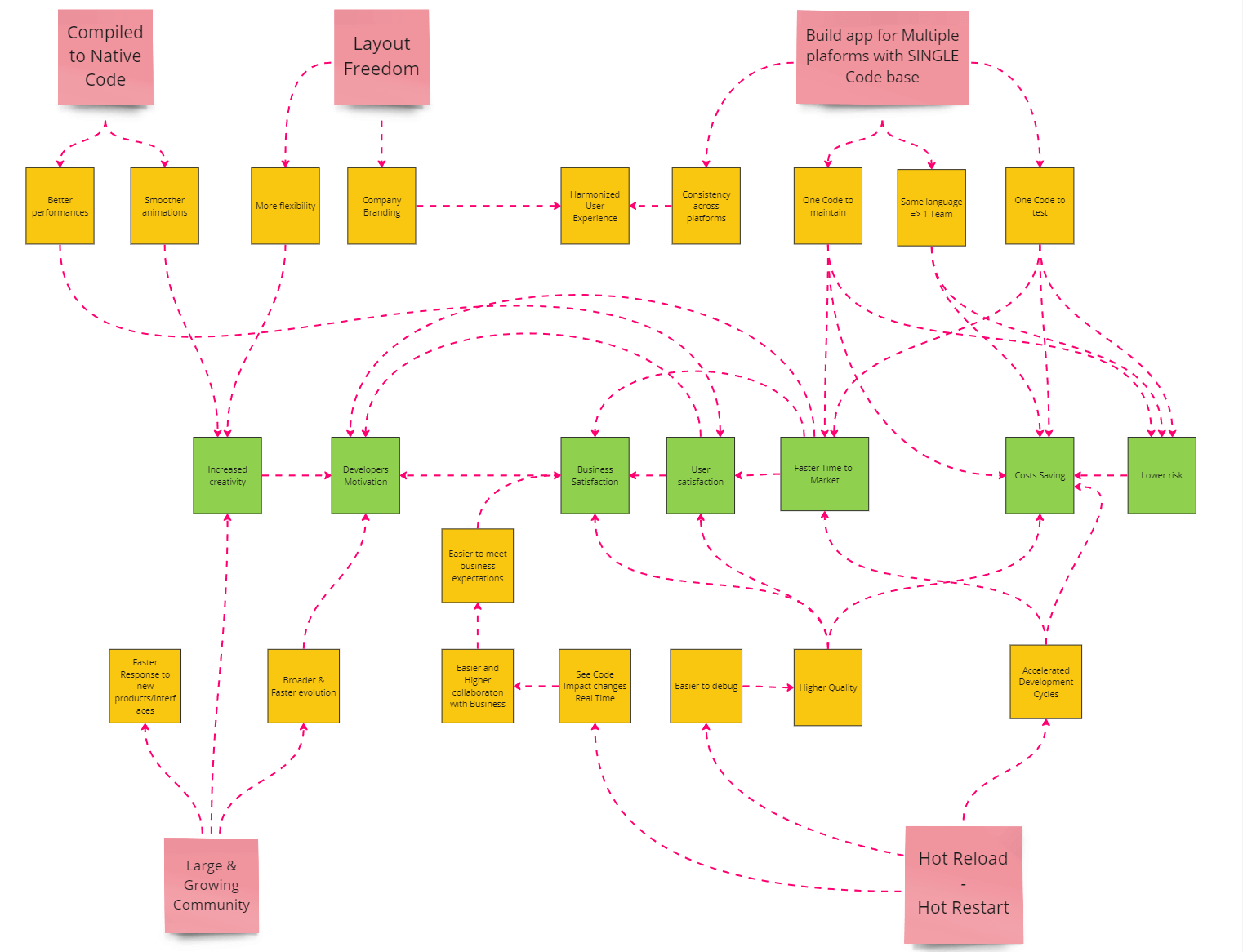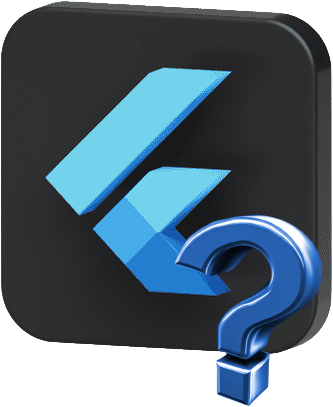Introduction
If
- You have a website but no mobile application yet
- You need a new mobile application
- You already have a mobile application but it only runs on Android or iOS?
- You need to upgrade your application?
- Do you have budget or schedule constraints for putting your application into production?
- Do you need a fast application with your own look and feel, fluid animations and not a web page?
- Have you never heard of Flutter?
then you've come to the right place.
This article will explain the following concepts in a pragmatic and straightforward way:
- What is Flutter?
- How is Flutter different?
- What are the benefits of using Flutter?
What is Flutter?
Flutter is an open source project, developed by Google and maintained by Google and the Community, whose first official version was released at the end of 2018.
With Flutter, you can create applications that run on
- 99% of recent smartphones and tablets (Android and Apple),
- computers running Windows, Mac and Linux, but also,
- most browsers, as a website or PWA,
- more recently, on Android TV and Raspberry.
How is Flutter different?
As mentioned above, with Flutter you only need to write one single computer program that will generate directly (or with very few adaptations) applications that will run on almost all smarphones, tablets, personal computers and the web.
Among Flutter's biggest differences from other solutions is that it
- allows these programs to run as if they had been written specifically for these devices! In other words, applications run in the device's own language, ensuring stability and speed.
- provides total freedom in all visual aspects (animations, design...)
- benefits from an ever-growing community of developers, ensuring unrivalled speed of evolution and improvement.
- can benefit more easily from the specific capabilities of the platform on which the program runs (access to sensors, payment services, biometrics, geolocation, etc.) thanks to its native code.
What are the benefits of using Flutter?
The benefits of using Flutter are numerous and can be classified as follows.
Financial benefits
Reduced development costs:
Flutter enables Android and iOS apps to be developed by a single team, which reduces costs.
Better return on investment (ROI):
Time and resources saved can be reinvested to improve the application or develop new features.
Time efficiency and speed to market
Time savings:
With a single code base, development and maintenance take less time.
Faster time-to-market:
Flutter enables the application to be launched on several platforms simultaneously.
Simultaneous updates on Android and iOS:
A single application update applies to all platforms, speeding up distribution.
Hot reload for faster development:
Developers can see changes instantly without restarting the app, speeding up the development process.
Flexibility and customization
Design flexibility:
Flutter offers total freedom to customize the user interface.
Smooth animations:
The user experience is enhanced by fluid, high-performance animations.
Large library of libraries:
Numerous ready-to-use libraries are available for adding specific functionality.
Easy to maintain and upgrade
Easy to maintain:
A single code base means maintenance is simpler and more cost-effective.
Simplified testing process:
A single code base also simplifies quality testing, speeding up updates and bug fixes.
Community and ecosystem
Fast-growing ecosystem:
Flutter's growing popularity is driving rapid growth in the tools and resources available.
Strong community support:
A large community of developers contributes to the ecosystem, making it easier to solve problems.
Cross-platform performance and consistency
Single code for multiple platforms:
The application has the same appearance and functionality on all devices.
Better consistency of user experience:
Flutter ensures that the application behaves uniformly on different platforms.
Integration and interoperability
Adaptability to platform-specific capabilities:
Flutter enables access to specific functionalities, such as sensors and payment services.
Interoperability with native languages and services:
Platform-specific code can be integrated if required, offering greater flexibility.
Flutter in a nutshell
The diagram below illustrates the core features of Flutter (in red), their immediate advantages (in orange), as well as the primary business benefits (in green).

Further reading
The following articles deal with a series of themes that describe this diagram:
Flutter and Business: Why It's the Strategic Choice for Financial Growth and Profitability
Discover how Flutter, backed by Google, offers businesses a multitude of financial benefits. From reduced development costs to brand consistency, this comprehensive guide explores why Flutter is a strategic investment for any growth-oriented company.
Optimizing Development Productivity with Flutter
Discover how Flutter revolutionizes productivity in mobile and web app development. From the efficiency of Hot Reload to the advantage of a single language, this comprehensive guide explores all aspects that make Flutter an unbeatable choice for developers and businesses alike.
Embrace Technological Agility with Flutter
Discover how Flutter's adaptability and cross-platform reach can be a game-changer for your business. Learn why Flutter is the technological partner you need for long-term success in an ever-evolving landscape.
Unlock the Advantages of Cross-Platform Development with Flutter & Dart
Explore how Flutter and Dart can revolutionize your software development strategy. Learn about code portability, cost savings, and rapid time-to-market benefits that make these technologies perfect for your business.
Why Flutter is the Strategic Choice for Enterprises: The Impact of Community and Open Source
Explore why Flutter, backed by a dynamic community and an open-source model, is the strategic choice for modern businesses looking to innovate and secure their tech investment.
Comprehensive Comparison of React Native vs Flutter: The Ultimate Decision-Making Guide for 2023
Uncover the pros and cons of React Native and Flutter in our extensive guide tailored for business leaders and decision-makers. Learn which mobile development framework best suits your project in 2023.
Unlocking Unprecedented Design Flexibility with Flutter
Explore how Flutter is revolutionizing application design by offering unparalleled creative freedom. From modular widgets to platform independence, this ultimate guide delves into the myriad advantages of using Flutter for both designers and developers.
Maximize Mobile App Performance and Optimization with Flutter
Discover how Flutter stands out in the realm of mobile app performance and optimization. From Ahead-of-Time (AOT) Compilation to high refresh rates and optimal resource management, explore the features that make Flutter a top choice for developers and businesses alike.
Elevate Your Business and User Experience with Flutter
Explore how Flutter transforms your business by delivering exceptional user experiences while maximizing ROI. Dive deep into the multi-faceted advantages of choosing Flutter for your mobile app development strategy.
Is Flutter Suitable for Showcase Websites? In-Depth Analysis and Recommendations
Discover nuanced insights on using Flutter Web for professional development, including benefits, challenges, and limitations, through a detailed account and practical recommendations based on real-world experience.
